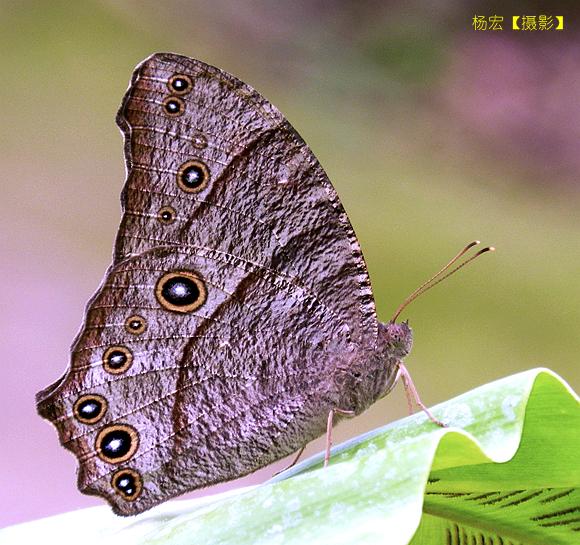Lepidoptera Hammerhorn suborder Butterfly Butterfly Butterfly Melanitis Fabricius, 12 species have been recorded worldwide, distributed in the Eastern Ocean, Australia, Africa and southern Paleobei, of which 2 species are distributed to southern Japan. There are three species recorded in China: (1) "Twilight Butterfly", (2) "Twilight Butterfly", and (3) Yellow Ribbon Twilight Butterfly. The genus is a medium to large butterfly. Adults fly fast, are more active in the morning and evening, and prefer to suck sap and rot fruit, mostly forest species.
After more than ten years, the author took ecological photos of all three species of butterflies in the genus. It is now compiled and compiled according to the plan, and published on the "Today's Headlines" on April 23, 2020, to feed readers.
1. Twilight Butterfly
Scientific classification
Realm: Animal kingdom Animalia
Phylum: Arthropoda Phylum Arthropoda
Class: Insecta
Order: Lepidoptera
Family: Nymphalidae
Genus: Melanitis Fabricius (1807)
Species: Melanitis leda (Linnaeus, 1758)
Distribution in China: South of the Yellow River.
Host plants: Poaceae, Spp.
Adult ecology: 1 year old, visible all year round. There are distinct seasonal variations in this species. Commonly found in tree-lined areas. At night, it can be attracted to the room by electric or fluorescent lamps.

Butterfly family / Genus Twilight / Butterfly / Butterfly Yang [Photo] - Figure 1
Butterfly family / Genus Twilight Butterfly / Butterfly / Yang Hong [Photo] - Figure 2
Butterfly family / Genus Twilight / Butterfly / Yang Hong [Photo] - Figure 3
Butterfly family / Genus Twilight / Butterfly / Yang Hong [Photo] - Figure 4
Butterfly family / Genus Twilight / Butterfly / Yang Hong [Photo] - Figure 5
Second, the twilight-eyed butterfly
Species: Melanitis phedima (Cramer, 1780)
Distribution in China: South of the Yangtze River.
Host plants: Poaceae, Weeds.
Adult ecology: 1 year old, visible all year round. It is commonly found in the woods and along the edge of the forest. Suck up sap.
Butterfly family / Genus Twilight / Butterfly / Butterfly / Yang Hong [Photo] - Figure 6
Butterfly family / Genus Pterophorus / Pterophorus / Yang Hong [Photo] - Figure 7
Butterfly family / Genus Twilight / Twilight Butterfly / Yang Hong [Photo] - Figure 8
Butterfly family / Genus Pterophorus / Pterophora / Yang Hong [Photo] - Figure 9
Butterfly family / Genus Pterophorus / Pterophorus / Yang Hong [Photo] - Figure 10
3. Yellow-banded twilight butterfly
Species: Melanitis zitenius (Herbst, 1796)
Chinese distribution: Yunnan, Hainan.
Host plant: Grasses.
Adult ecology: 1 year old, visible all year round. It is commonly found in forest edges.
Butterfly family / Genus Twilight / Yellow-banded Butterfly / Yang Hong [Photo] - Figure 11
Butterfly family / Genus Twilight / Yellow-banded Butterfly / Yang Hong [Photo] - Figure 12
Butterfly family / Genus Twilight / Yellow-banded Butterfly / Yang Hong [Photo] - Figure 13
Butterfly family / Genus Twilight / Yellow-banded Butterfly / Yang Hong [Photography] - Figure 14
Butterfly family / Genus Twilight / Yellow-banded Butterfly / Yang Hong [Photo] - Figure 15
Fourth, the difference between species
1. Distinction between the yellow-banded twilight butterfly and the first two species of butterfly (see figure)
(1) Front of the forewing: yellow banded spots in the apical corner area, which are significantly wider and brighter than the first two;
(2) The opposite side of the hindwing: there is a narrow and long area along the leading edge (see the indicator arrow), which is the same as the shading color of the upper end of the forewing, while the first two do not have this wing phase.
2. Distinction between the Twilight Butterfly and the Twilight Butterfly (see figure)
Two small white dots in the apical area of the front of the forewing, in the large dark-eyed markings: the mid-center area of the twilight-eyed butterfly and the lateral part of the twilight-eyed butterfly.
Twilight Butterfly
Twilight-eyed butterflies
Note: The above is just a simple way to distinguish when in the wild.
Note 2: This article is the author's original debut. In order to protect copyright, photos have been desumated.
In the future, the author will continue to release ecological photos of other "genus" butterflies in Lepidoptera and Hammerhorn suborder, which are worth looking forward to.
bibliography
Zhou Yao, editor-in-chief. Chinese Butterfly Chronicles. —2nd edition. Zhengzhou: Henan Science and Technology Press, 1999.6
Wu Chunsheng et al. editors-in-chief. Chinese Butterfly Atlas. Fuzhou: Straits Bookstore, 2017.1
[3] Bai Shuilong, etc. Complete Collection of Standard Primary Colors Illustrated 1 Butterfly Moth, Conservation Society, 1987